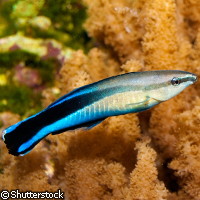Cleaner fish dish out punishment
Who would have thought that fish punish other fish when it comes to food? An international team of researchers has discovered that the male Labroides dimidiatus, a species of fish commonly called the bluestreak cleaner wrasse, has no qualms about chasing fellow fish that resort to sneaky food tactics. The results of the study, published in the journal Science, may help shed light on how humans developed their own complex system of punishment. You can find the bluestreak cleaner wrasse on coral reefs - a particularly favoured hunting ground for them. These fish basically survive on the parasites of larger - 'client' - fish but also like to steal a bite of their client's flesh here and there. A unique behavioural feature is how the wrasses work in pairs to feed on the slimy mucus that coats the clients' healthy fish skin. 'Theoretically, the best idea would be to bite your client right away before your partner does,' explained Professor Redouan Bshary of the Université de Neuchâtel in Switzerland, who also co-authored the study, 'because if the client swims away, you get the benefits of the tasty bite, but the costs are shared.' Problems start when a female wrasse chooses to nibble on the client's flesh, thus triggering the anger of the male wrasse - what the researchers call the 'cleaner fish' - that will chase the female for her sneaky eating behaviour. The threat of punishment is the crucial factor here. Professor Bshary and other researchers were aware that male wrasses chase the female around in a threatening manner; females are smaller than males. 'Clients will leave if they are cheated at a cleaning station,' explained lead author Dr Nichola Raihani of the Zoological Society of London (ZSL). 'That means the male's dinner leaves if the female cheats. By punishing cheating females, the males are not really sticking up for the clients but are making sure that they get a decent meal.' In the study, Professor Bshary and his colleagues placed two fish, along with normal fish flakes and prawns, in a tank to see what would be consumed. The wrasses favour prawns, so if either fish ate a prawn, the researchers removed all the food from the tank. The result? The male wrasse went wild when the female selected the prawns. As the experiment continued, the female wrasse nibbled, or tried to nibble, fewer and fewer prawns. The male, on the other hand, continued to select and taste prawns without any hesitation. 'Punishment promotes female cooperation, yielding direct foraging benefits to the male,' the authors wrote. The researchers from the ZSL's Institute of Zoology, Switzerland's Université de Neuchâtel and Australia's University of Queensland said their next course of action is to focus on the threat posed to male fish by similar-sized females who can undergo sex changes and challenge their authority.
Countries
Australia, Switzerland



